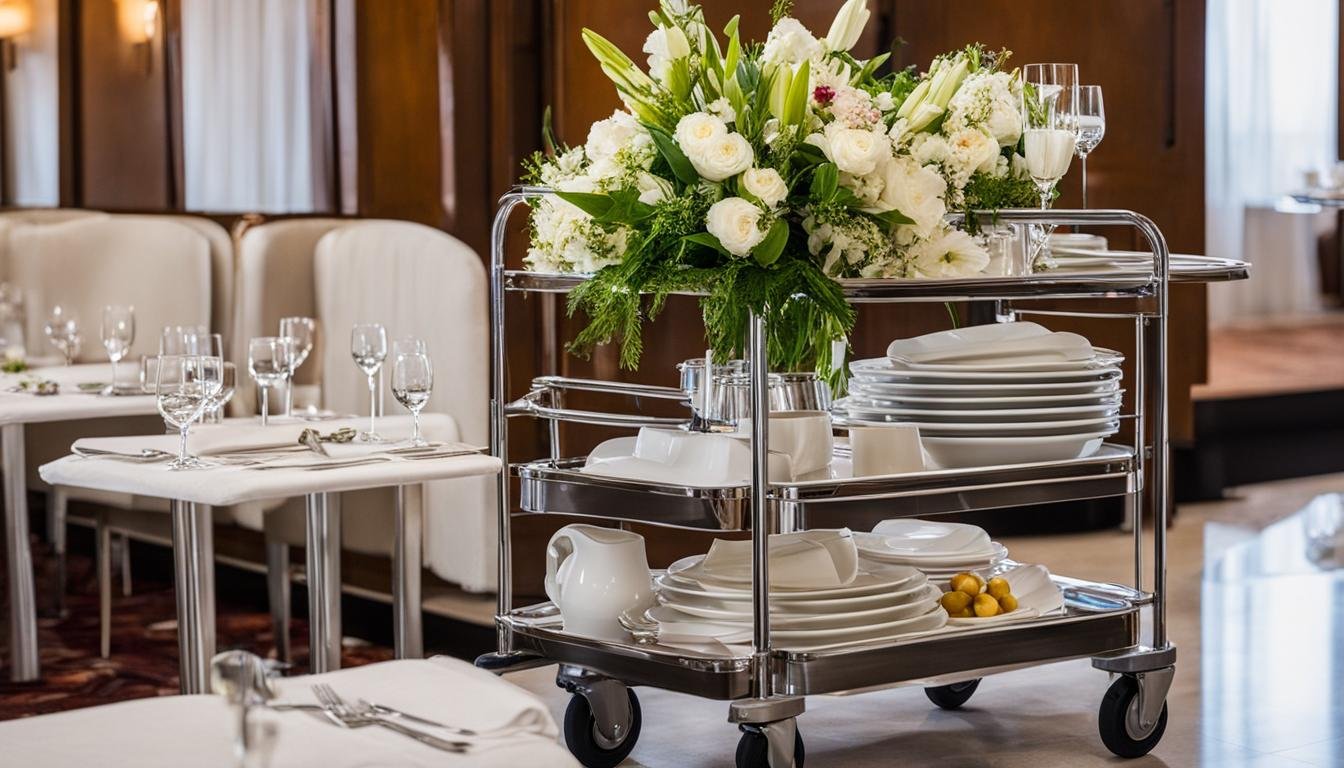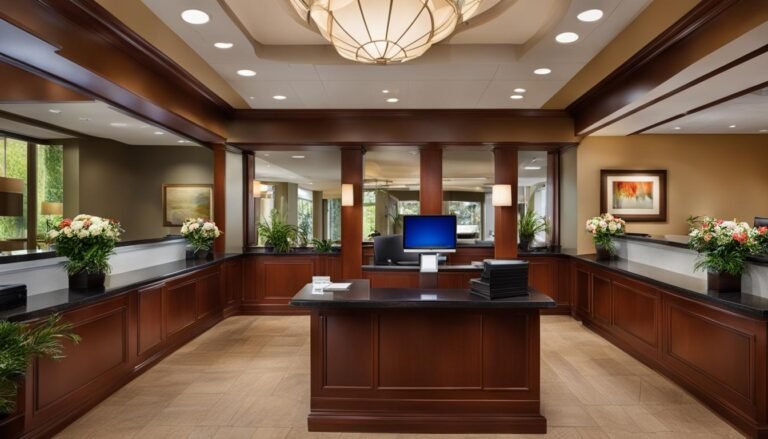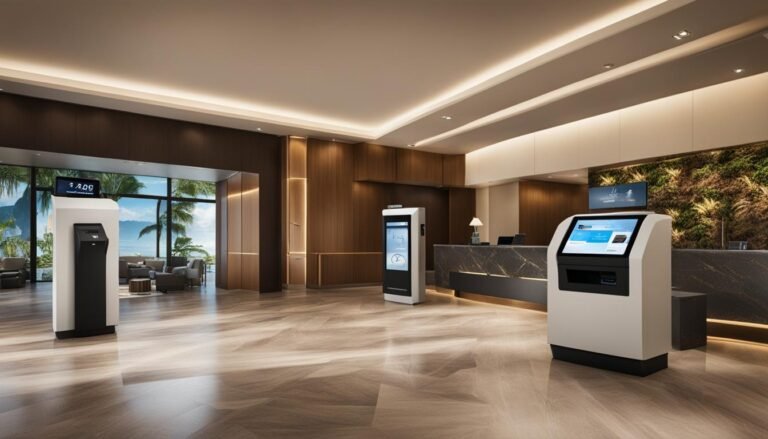Mastering Effective Room Service Management in Hotels
In the world of hospitality, room service plays a crucial role in ensuring a seamless and enjoyable experience for hotel guests. Whether it’s a late-night snack, a hearty breakfast in bed, or a full dinner service, having the option to dine in the comfort of their room is a luxury that many guests appreciate. However, managing room service operations in hotels requires careful planning, well-trained staff, and effective strategies to maximize revenue and guest satisfaction.
In this article, we will explore the different types of room service offered by hotels, the benefits and disadvantages of traditional room service, and alternative options to consider. We will also delve into the roles and responsibilities of in-house room service staff and discuss best practices for effective room service management. Whether you’re a hotel owner, manager, or aspiring hospitality professional, this article will provide valuable insights into mastering effective room service management in hotels.
Key Takeaways:
- Room service is an important process in hotel operations management.
- Hotels can offer different types of room service to cater to guest preferences.
- Offering room service can lead to increased revenue per guest and favorable guest reviews.
- There are also disadvantages to consider, such as the initial cost increase.
- Hotels can explore alternatives to traditional room service, such as partnering with local restaurants.
Types of Room Service in Hotels
When it comes to room service in hotels, there are different types available to cater to the preferences and needs of guests. Each type offers a unique dining experience that adds convenience and luxury to their stay.
1. Lobby Store Snacks and Drinks
In some hotels, guests have the option to order snacks and drinks from a lobby store menu. This type of room service provides a selection of ready-made or easy-to-prepare food and beverage options. It is a convenient choice for guests who prefer quick and light refreshments without the need for a full meal.
2. Breakfast in Bed
For a more indulgent experience, hotels offer breakfast in bed as part of their room service options. Guests can enjoy a delicious breakfast delivered right to their room, allowing them to start their day in a relaxed and comfortable manner.
3. Full Dinner Service
Hotels that offer full dinner service provide guests with the opportunity to order complete meals to their rooms during dinner hours. This type of room service allows guests to enjoy a restaurant-quality dining experience in the comfort of their own space.
4. 24/7 Service
The most convenient type of room service is 24/7 service, where guests can order food at any time during their stay. This ensures that guests have access to dining options whenever they need them, whether it’s a late-night snack or an early morning breakfast.
Overall, the various types of room service in hotels cater to different preferences and dining needs of guests. Whether it’s a quick snack, a luxurious breakfast in bed, a full dinner, or round-the-clock service, hotels strive to provide an exceptional culinary experience that enhances the overall stay.
Benefits of Hotel Room Service
Offering room service at a hotel can have several benefits. While it may not be a significant income generator, it can lead to increased revenue per guest. Guests are more likely to spend more time at the property when room service is offered, leading to additional spending on other hotel amenities. Room service can also contribute to favorable guest reviews, as it provides convenience and luxury amenities. Additionally, room service can be a unique selling proposition for hotels, allowing them to differentiate themselves from competitors.
One of the key advantages of room service is its ability to enhance guest satisfaction. By providing the convenience of dining in the comfort of their own rooms, hotels can cater to the needs and preferences of their guests. This personalized and convenient service can leave a lasting impression and contribute to positive word-of-mouth recommendations. Moreover, offering room service can also lead to increased revenue per guest. Guests who opt for room service are more likely to spend additional money on other hotel amenities, such as spa treatments, in-room entertainment, or minibar items. This can help hotels maximize their revenue and improve their overall financial performance.
“Room service offers guests the luxury of enjoying a delicious meal or snack without having to leave their room. It provides them with the convenience and comfort they desire, enhancing their overall experience at the hotel.”
Furthermore, room service can also help hotels differentiate themselves from their competitors. In a crowded market, having room service as an option can be a unique selling proposition that sets a hotel apart. It can attract guests who prioritize convenience and luxury, and who are willing to pay a premium for these amenities. By offering room service, hotels can position themselves as a destination that provides a comprehensive range of services and amenities, catering to the diverse needs and preferences of their guests.
| Benefits of Hotel Room Service |
|---|
| Enhances guest satisfaction |
| Increases revenue per guest |
| Contributes to positive guest reviews |
| Allows hotels to differentiate themselves from competitors |
Disadvantages of Traditional Hotel Room Service
The traditional hotel room service model, while offering convenience to guests, comes with its own set of disadvantages that hoteliers need to consider. Understanding these disadvantages can help hotels make informed decisions about their room service offerings.
One major disadvantage of traditional room service is the cost increase it entails. Hotels need to invest in additional staffing, equipment, and inventory to support room service operations. This initial cost increase can be significant and may impact the overall profitability of the hotel.
Miscommunication between kitchen and hotel staff can also be a challenge in traditional room service operations. With multiple parties involved in the process, there is a higher risk of miscommunication, which can lead to service breakdowns and negative guest experiences. It’s crucial for hotels to have efficient procedures and coordination mechanisms in place to mitigate this risk.
Negative guest reviews can also be a consequence of service-related issues in traditional room service. Delays in food delivery, incorrect orders, or poor quality meals can result in dissatisfied guests who may leave negative reviews online. These reviews can have a significant impact on a hotel’s reputation and potential revenue.
| Disadvantages of Traditional Room Service | Solutions/Alternatives |
|---|---|
| Cost increase | Exploring alternatives like partnering with local restaurants or offering grab-and-go meals |
| Miscommunication | Implementing efficient communication procedures and coordination mechanisms |
| Negative guest reviews | Ensuring accuracy, promptness, and quality in room service operations |
Despite these drawbacks, traditional room service can still be a valuable amenity for hotels, especially those catering to guests who prioritize convenience and luxurious experiences. However, it’s important for hotels to carefully weigh the advantages and disadvantages before implementing or continuing with their room service operations.
Alternatives to Traditional Hotel Room Service
Traditional room service in hotels may not always be the most cost-effective or efficient option for providing food to guests. Fortunately, there are alternative approaches that hotels can consider to meet the needs of their guests. By exploring partnerships with local restaurants, offering grab-and-go meals, and utilizing food delivery apps, hotels can provide convenient dining options while minimizing costs and improving overall guest satisfaction.
Local Restaurant Partnerships
One alternative to traditional room service is to establish partnerships with local restaurants. This allows hotels to offer a wider range of dining options to guests without the need for an extensive in-house kitchen and staff. By partnering with nearby restaurants, hotels can provide guests with a diverse selection of cuisines delivered directly to their rooms. This not only reduces the need for costly kitchen equipment and personnel but also supports local businesses and gives guests the opportunity to experience the local culinary scene.
Grab-and-Go Meals
Another alternative is to provide grab-and-go meals on-site. This option allows guests to quickly and conveniently pick up pre-packaged meals or snacks from designated areas within the hotel. Grab-and-go meals can be a cost-effective solution, as they require minimal preparation and staffing. They also cater to the growing demand for quick and casual dining options, especially among business travelers or guests on the go.
Food Delivery Apps
In today’s digital age, food delivery apps have become increasingly popular and convenient. Hotels can collaborate with food delivery platforms like Postmates or UberEats to offer guests the option of ordering their preferred meals from a wide range of local restaurants. By partnering with these apps, hotels can provide guests with access to a variety of cuisines and the convenience of doorstep delivery. Additionally, hotels can negotiate special discounts or perks for their guests, further enhancing the guest experience.
Overall, exploring alternatives to traditional room service can be a strategic move for hotels to optimize costs, expand dining options, and improve guest satisfaction. By partnering with local restaurants, offering grab-and-go meals, and utilizing food delivery apps, hotels can adapt to the changing preferences of guests and provide them with a more personalized and convenient dining experience.
Roles and Responsibilities of In-House Hotel Room Service
When it comes to in-house room service in hotels, there are specific roles and responsibilities that need to be fulfilled by the staff. These roles typically include kitchen staff, wait staff, and maintenance technicians.
The kitchen staff, led by the chef, play a vital role in preparing the food and beverage items for room service. They ensure that the menu is well-crafted, the ingredients are fresh, and the dishes are cooked to perfection. The kitchen staff also coordinates with the wait staff to ensure that orders are received accurately and delivered promptly to guest rooms.
The wait staff are responsible for taking guest orders, communicating with the kitchen staff, and delivering the food and beverages to the guest rooms. They should have excellent customer service skills and be knowledgeable about the menu offerings, as they may need to make recommendations or answer questions from guests. Additionally, the wait staff should be attentive to detail and ensure that orders are complete and presented in an appealing manner.
Maintenance technicians also play a crucial role in in-house room service. They are responsible for the upkeep and maintenance of the kitchen equipment to ensure that everything is in working order. This includes regular maintenance checks, troubleshooting any issues, and promptly addressing any equipment malfunctions. The technicians should be trained to handle any technical problems that may arise to minimize disruptions to the room service operations.
Table: Roles and Responsibilities of In-House Hotel Room Service
| Role | Responsibilities |
|---|---|
| Kitchen Staff | Preparing food and beverage items, menu planning, ingredient management |
| Wait Staff | Taking guest orders, communicating with the kitchen staff, delivering orders to guest rooms |
| Maintenance Technicians | Maintaining and troubleshooting kitchen equipment, addressing technical issues |
In-house room service requires a coordinated effort among the kitchen staff, wait staff, and maintenance technicians to ensure a seamless and satisfying experience for hotel guests. Each role carries its own set of responsibilities, and effective teamwork is essential to deliver top-notch service. By fulfilling their respective roles and working together, the in-house room service staff can contribute to the overall success and reputation of the hotel.
Hotel Room Service Management Best Practices
Implementing best practices in hotel room service management is crucial for maintaining smooth operations and delivering a high level of service to guests. By establishing standardized operating procedures, hotels can ensure consistency in service delivery and optimize their revenue potential. Additionally, utilizing a digital operations tool can streamline room service operations and enhance efficiency.
Standardized Operating Procedures
Standardized operating procedures are essential for ensuring that every aspect of room service is carried out consistently and effectively. This includes defining clear protocols for taking guest orders, preparing and delivering meals, and handling billing and payment processes. By adhering to standardized procedures, hotels can minimize errors, improve efficiency, and enhance the overall guest experience.
Incentivizing Guest Room Service Orders
Hotels can drive revenue by incentivizing guest room service orders through promotions, discounts, or exclusive offers. By offering special deals or complimentary items, hotels can encourage guests to take advantage of room service, ultimately leading to increased revenue per guest. Additionally, personalized recommendations based on guest preferences can further entice guests to order room service and enhance their dining experience.
Digital Operations Tool
A digital operations tool can greatly streamline and enhance room service operations. Such a tool can facilitate seamless communication between kitchen staff, wait staff, and guests, ensuring efficient and accurate order processing. It can also provide real-time tracking of orders and enable guests to provide feedback directly through the platform. Furthermore, a digital operations tool can help hotels gather data on guest preferences and ordering patterns, allowing them to personalize the room service experience and improve guest satisfaction.
By implementing these best practices, hotels can optimize their room service operations, deliver exceptional service, and maximize revenue potential. Standardized operating procedures, incentives for guest room service orders, and the use of digital operations tools can all contribute to a seamless and satisfying room service experience for guests.
Hotel Food Service Management Strategies for Maximizing Revenue
Effective management of food service in hotels is crucial for maximizing revenue. Hotels can implement various strategies to enhance the dining experience, drive customer satisfaction, and increase profitability.
Hire for Attitude
When building a successful food service team, it’s important to prioritize hiring individuals with a positive attitude. In the hospitality industry, employees who genuinely enjoy serving others can elevate the overall guest experience. Look for candidates who demonstrate a strong work ethic, excellent communication skills, and a passion for providing exceptional service. Encourage a culture of teamwork and continuous learning to foster a motivated and engaged staff.
Gather Guest Preferences
Understanding guest preferences and personalizing the dining experience can significantly impact customer satisfaction. Hotels can gather guest preferences through surveys, feedback forms, or even by engaging with guests during their stay. This information can be used to tailor menu offerings, create special promotions, and provide personalized recommendations. By catering to individual preferences, hotels can enhance the dining experience and create memorable moments for their guests.
Coordinate Back-of-House Efficiently
Efficient coordination of back-of-house operations is essential for seamless food service management. Clear communication and collaboration between kitchen staff, wait staff, and other team members are crucial to delivering timely and accurate service. Implementing streamlined processes, such as a centralized order management system or kitchen display screens, can help improve efficiency and minimize errors. Proper training and cross-training of staff members can also ensure smooth operations and minimize disruptions.
| Key Strategies for Maximizing Revenue: |
|---|
| Hire employees with a positive attitude and strong work ethic |
| Gather guest preferences to personalize the dining experience |
| Coordinate back-of-house operations for efficient service delivery |
By implementing these strategies, hotels can optimize their food service operations and maximize revenue. Providing exceptional service, personalized experiences, and efficient operations can lead to increased guest satisfaction and repeat business.
Hotel Management and Hospitality Industry Overview
Hotel management is a crucial aspect of the hospitality industry, encompassing a range of responsibilities to ensure a positive guest experience. It involves overseeing various departments such as administration, catering, housekeeping, and accounting to provide comfortable accommodations, good food, and excellent service to travelers. Hospitality management, a broader term, includes people management in multiple sectors, with hotels being one of them. The hotel industry has a rich history and has evolved to cater to the diverse needs and preferences of travelers.
A career in hotel management offers various job opportunities and career paths. However, it requires proper education and training to succeed in this field. Individuals aspiring to work in hotel management should acquire knowledge in areas such as customer service, marketing, financial management, and operations. They should possess excellent communication and leadership skills to effectively manage staff and ensure the smooth functioning of hotel operations.
As the hotel industry continues to grow and evolve, staying updated with industry trends and advancements is crucial for success. This includes keeping abreast of technological innovations that can enhance guest experiences and streamline operations. The ability to adapt to changing guest preferences and market demands is essential for hotel managers to stay competitive in the industry.
Hotel Departments and Marketing in the Hospitality Industry
Successful hotels rely on the collaboration of various departments to provide a positive and memorable guest experience. Each department has specific responsibilities and plays a crucial role in the overall operations and success of the hotel. Let’s take a closer look at the key hotel departments and explore the importance of marketing in the hospitality industry.
1. Management and Finance
The management and finance department is responsible for overseeing the hotel’s operations and ensuring financial stability. They handle budgeting, financial planning, and financial reporting. This department also oversees the hiring and training of staff, as well as the overall management of the hotel’s resources.
2. Food and Beverage
The food and beverage department is responsible for providing guests with exceptional dining experiences. This department manages the hotel’s restaurants, bars, and room service operations. They develop menus, oversee food preparation and presentation, and ensure high-quality service.
3. Front Office
The front office department is the face of the hotel and is responsible for guest services such as check-in, check-out, concierge services, and handling guest inquiries and complaints. This department plays a vital role in creating a positive first impression and ensuring guest satisfaction throughout their stay.
4. Housekeeping
The housekeeping department is responsible for maintaining the cleanliness and orderliness of guest rooms, public areas, and other hotel facilities. They ensure that guests have a comfortable and clean environment during their stay. Housekeeping staff also play a crucial role in maintaining the overall hygiene and safety standards of the hotel.
5. Maintenance
The maintenance department is responsible for the upkeep and maintenance of the hotel’s physical facilities. They handle repairs, preventive maintenance, and ensure that all equipment and systems are in optimal working condition. The maintenance department also plays a role in ensuring guest safety and comfort.
6. Reservations and Marketing
The reservations and marketing department is responsible for driving bookings and revenue for the hotel. They handle room reservations, manage online and offline marketing campaigns, and build relationships with travel agencies and corporate clients. This department plays a crucial role in promoting the hotel’s brand, attracting guests, and maximizing revenue.
7. Human Resources
The human resources department is responsible for recruiting, training, and managing the hotel’s staff. They handle employee onboarding, performance evaluations, and ensure compliance with labor laws and regulations. This department also plays a crucial role in fostering a positive work environment and employee satisfaction.
| Department | Responsibilities |
|---|---|
| Management and Finance | Overseeing hotel operations and financial planning |
| Food and Beverage | Managing restaurants, bars, and room service operations |
| Front Office | Guest services, check-in, check-out, concierge services |
| Housekeeping | Maintaining cleanliness of guest rooms and public areas |
| Maintenance | Upkeep and maintenance of hotel facilities |
| Reservations and Marketing | Driving bookings, managing marketing campaigns |
| Human Resources | Recruiting, training, and managing hotel staff |
Conclusion
Embarking on a hotel management career requires a solid foundation of industry knowledge and a passion for providing exceptional hospitality. Room service management is a crucial aspect of hotel operations, contributing to guest satisfaction and increased revenue per guest. By staying up-to-date with industry trends and implementing best practices, hotel managers can optimize their operations and deliver unforgettable experiences.
Industry knowledge is key in navigating the ever-changing landscape of the hotel industry. It’s important to stay informed about emerging trends, such as the shift towards alternative room service options like partnering with local restaurants or offering grab-and-go meals. By adapting to these trends, hotels can better meet guest expectations and remain competitive.
A successful hotel management career is built on continuous learning and personal development. As technology evolves and guest preferences change, it’s crucial to embrace new ideas and strategies. By staying curious and investing in ongoing education, hotel managers can stay ahead of the curve and excel in their roles.







